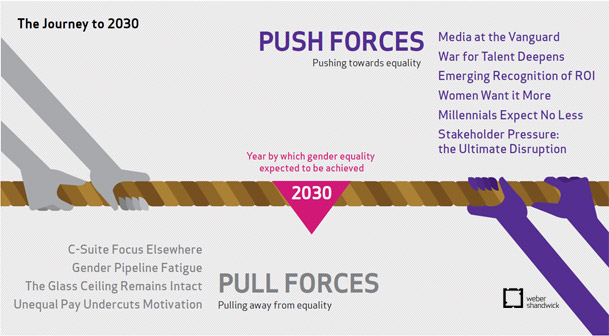New Global Survey Among C-Level Executives Finds Weak Commitment to Gender Equality and Senior Women Experiencing Gender Pipeline Fatigue
NEW YORK, October 20, 2015 – According to research released today by leading global communications and engagement firm Weber Shandwick, nearly three-quarters (73 percent) of global senior executives believe that by 2030 women will occupy the top ranks of most large global companies in numbers equal to that of men.

However, most global C-Level executives (56 percent) report that their organizations have not adopted formal goals that might turn this expectation into a reality and just four in 10 (39 percent) identify gender diversity in senior management as a high business priority, ranking seventh among 10 priorities. In the absence of such proactive steps, women appear to be developing “gender pipeline fatigue” and have come to believe that only through compulsory measures such as governmental mandates on equal pay will parity result any time soon.
“Our groundbreaking report identifies a paradox along the road to C-Suite gender equality by 2030. Several factors are simultaneously pushing gender equality forward and pulling it back. Companies need to prepare now to accept women into their senior ranks and take action to support their view of the future,” says Gail Heimann, president of Weber Shandwick. “This global survey of decision-makers gives rise to a palpable sense of urgency for action now if we are to achieve gender parity at the upper rungs of management within this century.”

The study, Gender Equality in the Executive Ranks: A Paradox — The Journey to 2030, was sponsored by Weber Shandwick and KRC Research and conducted by The Economist Intelligence Unit (EIU) in 2015. It is based on an online survey of 327 senior executives across 55 countries in North America, EMEA (Europe, the Middle East, Africa), APAC (Asia Pacific) and Latin America. Half of the full sample includes an exclusive segment of C-Level executives including CEOs. Weber Shandwick purposefully designed the study to oversample C-Level members to reflect the perspectives of those who can directly influence change.
The report provides an actionable framework for building a gender-forward reputation. The data reveals significant push factors driving momentum for women’s advancement alongside some troubling pull factors that are impeding its ascent. Additionally, the approaches of companies that are making gender equality a priority are examined to serve as models for others less proactive.
The Push Forces: Ready or Not, Here We Come
Six powerful and escalating forces are likely to accelerate the movement toward gender equality. The confluence of these push forces is likely to overwhelm the pull forces holding gender equality back and corporations must not find themselves left in the lurch. “The good news is that we are now at a point reminiscent of past social movements where periods of inertia and passive support are abruptly overcome and goals suddenly become within reach,” says Leslie Gaines-Ross, chief reputation strategist at Weber Shandwick. “Our research reveals that pressure is building toward gender equality progress. Wise corporate leadership should heed the unmistakable signs. A business-as-usual approach that leaves companies without a pool of women in senior positions will have severely negative reputational consequences.”
The push forces that we have identified are backed by these findings:
- More than two-thirds of executives (68 percent) have noticed increasing media coverage, including social media, drawing public attention to the issue of gender equality. Perceptions match reality: there has been more than a threefold increase in articles worldwide about female CEOs since 2010.
- “Improving our ability to attract and retain talented women” is the prime reason cited for involvement in corporate gender equality initiatives.
- Among executives involved in gender equality efforts, 38 percent acknowledge that diverse gender perspectives lead to better financial performance.
- Executives identify the influence of stakeholders as being the top factor that inevitably pressures them to demonstrate gender equality in the senior ranks.
- Non-C-Level women are significantly more likely than their male peers to aspire to a C-level position (76 percent vs. 56 percent, respectively).
- Three-quarters of Millennials (76 percent) say that having gender equality in the C-Suite is important to them, a marked increase over Gen Xers (44 percent) and Boomers (48 percent).
Some Hope Ahead: Gender-Forward Pioneers (GFPs)
Although only three in 10 global executives report that their companies highly prioritize diversity in senior management, their approaches are instructive. How does this leading-edge segment — we call them Gender-Forward Pioneers, or GFPs — move toward balancing their C-Suites?
- GFPs take a stand. GFPs are much more likely than non-GFPs to formalize clear goals for improving gender equality (58 percent vs. 37 percent, respectively).
- GFPs commit from the top. At GFPs, 42 percent of CEOs are leading the way compared to 21 percent at non-GFPs. This CEO-level involvement has a ripple effect: Companies whose CEOs are “chief equality officers” also have executive teams highly involved in gender equality initiatives.
- GFPs share the news. Nearly seven in 10 GFPs (68 percent) publicly share information about their gender equality efforts. They believe such communications enhance their reputations, and they frequently communicate these efforts online, a wise approach for reaching a younger audience.
- GFPs implement and execute more. At least half of the GFPs use minimally 13 of the 16 gender equality actions that we asked about, while half of non-GFPs used just four. GFPs are dramatically more likely than non-GFPs to include gender equality as a performance review measure for managers, to seek evaluation of their gender equality practices by third parties, and to create committees to promote gender equality.
In conjunction with the release of Gender Equality in the Executive Ranks: A Paradox — The Journey to 2030, Weber Shandwick has developed the Weber Shandwick GFP 2015 Index, a measure of gender balance in the management teams of the Fortune Global 100 companies. Our proprietary analysis identifies that only 12.5 percent of the most senior leaders of the world’s largest companies are women. This Index will be extended to the Fortune Global 500 by year-end and repeated annually.
Guidelines for Achieving Gender Equality at the C-Level
Weber Shandwick recommends that business leaders and their companies consider the following strategies to achieve greater gender equality (see our report for more detail):
- Follow the leaders. Metrics matter
- CEO champions are required
- Value talent
- Ignore the media at your own risk
- Communicate, don’t equivocate
- Develop your women’s leadership visibility
- Scorecards are arriving. Pursue honors of recognition and leverage them
- Use storytelling to craft a compelling narrative
Click here to find out more about Gender Equality in the Executive Ranks: A Paradox — The Journey to 2030.
About The Research
Results are based on an online survey of 327 senior executives — managers through C-Level, including CEOs and board chairs — conducted by the Economist Intelligence Unit. 55 countries across six regions are represented in the global sample. Responding executives work for companies ranging in revenue size (USD) from $250 million to more than $10 billion. In North America and Europe, companies with $500 million or more in revenue were included and in all other regions, companies with $250 million or more in revenue were included. A mix of industries is represented. The margin of error for the full global sample is ±4.5 percentage points with 90% confidence.
About the Weber Shandwick GFP Index
To determine how many senior executives are women in the Fortune Global 100, we used two sources of information: 1) The company leadership page of the corporate website, and 2) Senior executive management listed in the company’s latest annual report. If an executive was listed in one or both of these sources, they were included in our list. We then identified the gender of the executive. To the best of our ability, we listed only current senior management. Our research was conducted from September 18 – October 1, 2015.
About Weber Shandwick
Weber Shandwick is a leading global communications and engagement firm in 75 cities across 34 countries and operations extending to 123 cities in 81 countries. The firm’s diverse team of strategists, analysts, producers, designers, developers and campaign activators has won the most prestigious awards in the world for innovative, creative approaches and impactful work, including being honored as an Ad Age A-List Agency in 2014 and 2015, PRWeek’s 2015 Global Agency of the Year and The Holmes Report’s 2014 Global Agency of the Year. Weber Shandwick and its Prime unit have won a combined 25 Cannes Lions since 2009. Weber Shandwick was also named a Best Place to Work by Ad Age in 2014 and PRWeek in 2013 and 2014. The firm deploys deep expertise across sectors and specialty areas, including consumer marketing, corporate reputation, healthcare, technology, public affairs, financial services, corporate social responsibility, financial communications and crisis management, using proprietary social, digital and analytics methodologies. Weber Shandwick is part of the Interpublic Group (NYSE: IPG). For more information, visit https://www.webershandwick.com/.
About KRC Research
KRC Research is a full-service market research firm that specializes in the kind of research needed for effective communications—communications that reach, engage and persuade. A unit of the Interpublic Group of Companies (NYSE: IPG), KRC Research offers the quality and custom service of a small firm along with the reach of a global organization. For over 30 years, KRC Research has worked on behalf of corporations, governments, not-for-profits and the communications firms that represent them. Staffed with market research professionals from the worlds of political campaigns, consumer marketing, journalism and academia, we are flexible, practical, creative, knowledgeable and fast, combining sophisticated research tools with real-world communications experience. For more information, visit www.krcresearch.com.